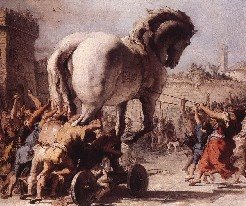 Quidquid id est, timeo Danaos et dona ferentis*
Quidquid id est, timeo Danaos et dona ferentis*The Trojan Horse - remember it? Helen of Troy? Beware Greeks bearing gifts? That "steed of monstrous height", packed to the withers with sword-wielding Greeks, hauled upon the shores of Ilios (modern Turkey), and effectively ended the Trojan War? If not, grab your Virgil & re-read the Aenead. Or swallow a handful of Wake Ups and rent Troy.
The Trojans lost that one: the men were all killed, the women and children sold into slavery. But I wonder to what extent the archetype of the evil equine has survived into the collective unconscious of the modern Turk. Do they skulk about, giving the evil eye to any old nag they see, on the off chance that Greek soldiers are secreted in its innards? Then this afternoon, as I was munching on a Turkish crispy-salty-snacky thing and having a thoroughly civilised discussion on blended scotches, I chanced upon an story (warning: graphic photos & I can only imagine what the video is like) which leads me to suspect that the memory of the Trojan Horse has not only survived but that it's payback time. It's the 2nd Trojan War (the Trojans Strikes Back) and this time the Horse has no chance. The new field of battle is the government-run Refik Saydam Hygiene Center (RSHC) where a recently obtained video shows
"... shocking images of struggling horses who are violently dragged to the ground with ropes so that their necks can be slashed with a scalpel while they are completely conscious. Workers bind the horses' legs closely to their bodies for restraint and sit on top of the struggling animals to hold them down. Moans of agony and shudders of pain reveal the horses to be fully conscious during the procedure, which sometimes lasts for hours (my italics). The horses are left to bleed to death and their bloodied bodies are dragged outside and dumped on the side of the street.
Because it is easy to obtain and inexpensive, blood serum from horses is commonly used in medical products. At one time, horse serum was used in the U.S. in the production of antitoxins (including rabies shots) until it was discovered that 16% of patients treated with the serum developed a dangerous condition called "serum sickness". Since then, the need and demand for horse blood has decreased markedly in the West and when it is required, it is drawn from horses much the same way as it is from humans: with an intravenous needle. The bloodletting is humane and the horses are calm during the procedure. Possibly, they are rewarded with apple juice and a cookie afterwards. At the very least, they get to see another day.
The video reveals RSHC technicians who cannot or will not make a proper needle insertion and who instead slash the horses' necks in order to expose the jugular vein. There is no excuse for this shoddy and cruel technique.
... but it got me thinking - how high is Turkey on my list? (- although, in truth, I have 2 lists: the Must-See list and the Only If I Had a Free Ticket list). Some places in the world haven't earned a spot on either list (rhymes with Shina) but Turkey has been fence-sitting, jumping from one list to the other, for a number of years. I am admittedly beguiled by its architecture and its schitzophrenic east-meets-west dualism, its is-it-Asia-or-is-it-Europe identity crisis. But its track record in playing nicely with others is appalling. Human rights (or the lack thereof) in Turkey have long attracted international attention and, although sufficient progress has been made to allow the start of accession negotiations into the European Union, concerns remain. Add crimes against horses to their list.
I can only hope that the 3rd installment of the Trojan War Trilogy will be subtitled "The Return of the Gelding".
* So nice to be quoting Virgil for a change rather than the Q'uran.
Addendum: feel free to e-mail RSHC President Dr. Turan Aslan and ask him to stop these neanderthal procedures immediately (resak@saglik.gov.tr) and while you're at it, drop Mr. Ahmet Necdet Sezer, the president of Turkey, a line too (mailto:cumhurbaskanligi@tccb.gov.tr); perhaps he isn't aware that the Turkish government is failing to meet European animal protection standards.



No comments:
Post a Comment